Search the Special Collections and Archives Portal
Search Results
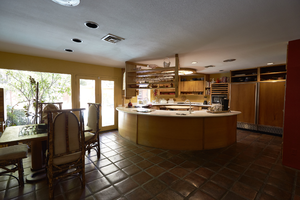
Photograph of Kitchen at the House of Straus, Las Vegas (Nev.), July 14, 2016
Date
Archival Collection
Description
For decades Joyce Elise Straus opened her home, the "House of Straus," to area youth seeking art experiences. That effort included the opening of the School of Creative Thinking in 1976. Her varied artwork is widely collected in the Southern Nevada community. Straus was married for 56 years to Dr. Neil B. Straus. Her son David Straus and his wife Heidi continue the tradition.
Image
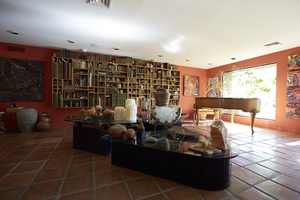
Photograph of Living room at the House of Straus, Las Vegas (Nev.), July 14, 2016
Date
Archival Collection
Description
For decades Joyce Elise Straus opened her home, the "House of Straus," to area youth seeking art experiences. That effort included the opening of the School of Creative Thinking in 1976. Her varied artwork is widely collected in the Southern Nevada community. Straus was married for 56 years to Dr. Neil B. Straus. Her son David Straus and his wife Heidi continue the tradition.
Image
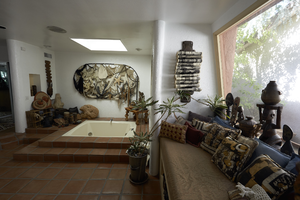
Photograph of bathroom at the House of Straus, Las Vegas (Nev.), July 14, 2016
Date
Archival Collection
Description
For decades Joyce Elise Straus opened her home, the "House of Straus," to area youth seeking art experiences. That effort included the opening of the School of Creative Thinking in 1976. Her varied artwork is widely collected in the Southern Nevada community. Straus was married for 56 years to Dr. Neil B. Straus. Her son David Straus and his wife Heidi continue the tradition.
Image

Transcript of interview with Gil Cohen by Claytee White, August 5, 2014
Date
Archival Collection
Description
Interview with Gil Cohen by Claytee White on August 5, 2015. In this interview, Cohen discusses growing up in Las Vegas and attending University of Nevada at Reno. He returned to Las Vegas to join the management training program at the Stardust. He talks about his friendships with Moe Dalitz and Carl Cohen, and his interest in golfing. He also discusses corporate ownership of casinos, unions, and his experiences working at different Strip hotels.
Gil Cohen came to Las Vegas in 1957, when was ten years old, when his father, Yale Cohen, was recruited by Moe Dalitz to work at the Stardust Hotel and Casino. Cohen graduated from University of Nevada Reno, and started working at the Stardust through the management-training program. In 1975, he was made hotel manager, his first of many leadership positions in Strip properties, which have included the Dunes, Aladdin, Hacienda and Monte Carlo, where he currently works as a casino host.
Text
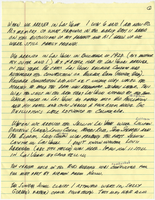
Essay, by Charles Salton (1921-2004), 2002
Date
Archival Collection
Description
Handwritten essay by Adele Baratz?s brother, Charles Salton, in 2002 describing his family history since coming to Las Vegas in 1928, and the history of the Jewish community in the area.
Text
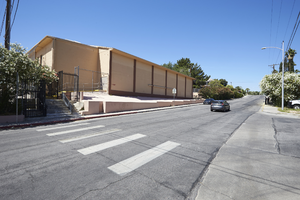
Photograph of Kolod Recreation and Youth Center at former Temple Beth Sholom building on Oakey Blvd., Las Vegas, Nevada, May 19, 2016
Date
Archival Collection
Description
The Ruby Kolod Recreation Center and Danny Kolod Youth Center at the former Temple Beth Sholom and Jewish Community Center facility at 1600 E. Oakey Boulevard now serve as recreation space for the Innovations International Charter School of Nevada. Kolod donated money to build the temple's Danny Kolod Youth Center in memory of his son, who was killed in a boating accident. Ruby Kolod died on August 11, 1967.
Image

Transcript of interview with Henry Kronberg by Barbara Tabach, February 26, 2015 and April 13, 2015
Date
Archival Collection
Description
Interview with Henry Kronberg by Barbara Tabach in two sessions, February 26 and April 13, 2015. In the first session Kronberg talks about his childhood in Germany and Poland and his experience being imprisoned by the Gestapo, and transported to a concentration camp. He survived the Holocaust and met his wife, and they moved to the United States in 1946. He discusses being reunited with his sister in Las Vegas after decades of searching, and moved his family to Las Vegas in 1962. Kronberg talks about becoming involved with Jewish life here, and his wife, Lillian's involvement at Temple Beth Sholom. In the second session, Kronberg discusses purchasing Stoney's, a loan and pawn shop, including some of the clientele and merchandise. He also discusses other social and environmental concerns like anti-Semitism and water resources in Southern Nevada.
Henry Kronberg was born in 1920 and spent his early childhood in a town on the border of Poland and Germany, about 40 miles from Krakow. For years he felt uncomfortable telling his story of surviving the Nazi concentration camps of World War II. Today his name is linked to the Sperling Kronberg Mack Holocaust Resource Center in Las Vegas. And in his soft-spoken manner, Henry recalls his ordeal of loss of family and survival during this most heinous of situations through backbreaking labor and ingenuity. At the end of the war, Henry met the love of his life, Lillian, also a survivor. The two married in 1946 in Frankfurt and immigrated to New Jersey where she had relatives. He describes their difficulties and the various jobs he held until becoming an excellent baker. Then in 1962 an interesting choice took him to a bar mitzvah in Canada. While there the dinner conversation lead him to a great discovery?his sister Lala had survived and was living in Las Vegas. Soon he moved his wife and daughter to Las Vegas. His first foray into business was with his brother-in-law. However, soon it was important to be independent and to control his own destiny. He purchased a going concern, Stoney's Pawn Shop, from Dr. Alexander Coblentz, one of the city's first doctors. He became the fourth owner of Stoney's and operated it until selling it to Steven Mack in 1998. Henry and his wife were active in the Jewish community. They joined Temple Beth Sholom and became fast friends with many of the early leaders of Las Vegas and became a respected member of the secular and Jewish communities.
Text
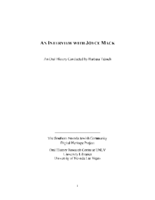
Transcript of interview with Joyce Mack by Barbara Tabach, February 23, 2015
Date
Archival Collection
Description
In this interview, Joyce Mack discusses meeting her husband, Jerry Mack, in Los Angeles,their early life as a couple, and moving to Las Vegas at the suggestion of Jerry's father, Nate Mack. She discusses how Jerry met Parry Thomas and their banking and real estate investments. Mrs. Mack talks about the opening of the Thomas and Mack Center at UNLV, and the development of the strip hotels, and discusses her children.
Joyce Mack: wife to Jerry Mack and matriarch of one of the most influential families of Las Vegas history. During this oral history conversation, she begins by tracing her family ancestry from Kiev to New York to Omaha and then Los Angeles, where she was born and raised. At a UCLA fraternity party in the early 1940s, a teenage Joyce Rosenberg was swept off her feet by her older brother's friend Jerry Mack. Jerry was from Boulder City, Nevada and had attended school in Las Vegas. In 1946, the couple married and took an extended honeymoon throughout the United States and Cuba. Soon afterwards, Jerry's father Nate Mack, a businessman and real estate developer encouraged the newlyweds to come to Las Vegas. She tells of Jerry sharing his vision of the valley's future. Thus began a successful journey that traverses decades of Las Vegas history and breathtaking growth in which the Macks were active participants and leaders. Joyce recalls the people the first met, who they raised their children side-by-side with and became lasting friends. These people were other Las Vegas pioneers including the Greenspuns and mostly importantly her husband's partnership with Parry Thomas which created the Bank of Las Vegas. It was their partnership she explains that reduced the presence of the mob element. As members of the small Jewish community of the late 1940s, the Macks would participate in the founding of Temple Beth Sholom.
Text
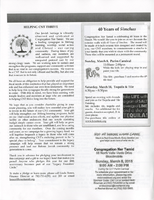
Newsletter from Congregation Ner Tamid, March 2015
Date
Archival Collection
Description
Newsletter from Congregation Ner Tamid, March 2015
Text
Audio clip from interview with Andy Katz, February 16, 2016
Date
Archival Collection
Description
In this clip, Andy Katz discusses the programs at Manpower, an employment agency franchise that his parents established in Las Vegas in the 1960s, and still exists today. Katz became involved at an early age, and talks about employment opportunities he had growing up.
Sound
